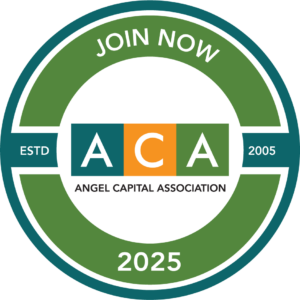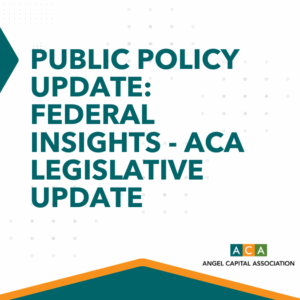Angel investors take note: Capitol Hill is abuzz with bipartisan momentum on legislation affecting early-stage investing, market access, and small business capital formation. On July 21, 2025, the U.S. House of Representatives passed a suite of bills with overwhelming support—many by unanimous voice vote—aimed at protecting senior investors, modernizing capital access rules, improving SEC oversight, and reducing regulatory burdens on startups and emerging growth companies. These developments represent meaningful progress in aligning federal policy with the realities of today’s entrepreneurial and investment landscape.
H.R. 1469 – Senior Security Act of 2025
This bill establishes the Senior Investor Taskforce within the SEC to protect seniors from financial exploitation. The task force will have to report to Congress on challenges facing senior investors and recommend policy changes to resolve them. The GAO will have to study the financial exploitation of seniors and report to Congress within two years.
This bill unanimously passed the house by voice vote on July 21st. It was originally introduced by Rep. Josh Gottheimer (D-NJ) on February 21st. It was reported out of the House Financial Services Committee on May 20th by a vote of 50-0. It now heads to the Senate, where it was referred to the Senate Committee on Banking, Housing, and Urban Affairs.
H.R. 3339 – Equal Opportunity for All Investors Act of 2025
This bill allows individuals to qualify as accredited investors by taking an exam to demonstrate their understanding of private markets. The exam will be administered by the Financial Industry Regulatory Authority and would demonstrate knowledge of different types of securities, disclosure requirements, corporate governance, financial statements, risk associated with unregistered securities, and potential conflicts of interest.
This bill unanimously passed the House by voice vote on July 21st. It was originally introduced by Rep. Mike Flood (R-NE) on May 13th. It passed out of the House Financial Services Committee on June 3rd
by a vote of 49-2. It now heads to the Senate, where it was referred to the Senate Committee on Banking, Housing, and Urban Affairs.
H.R. 3343 – the Greenlighting Growth Act
This bill updates Title I of the JOBS Act by clarifying that current and former Emerging Growth Companies (EGC) do not need to provide financial statements for a period earlier than the two years of audited financial statements required during their IPO. A former EGC would also not need to present financial statements preceding the earliest audit period in connection with its IPO registration. An EGC is a type of issuer that qualifies for reduced disclosures after its initial IPO if its annual gross revenues are below a specific amount.
This bill unanimously passed the House by a voice vote on July 21st. It was originally introduced by Rep. Mike Haridopolos on May 13th. It passed out of the House Financial Services Committee on May 20th by a 49-2 vote. It now heads to the Senate, where it was referred to the Committee on Banking, Housing, and Urban Affairs.
H.R. 3351 – Improving Access to Small Business Information Act
This bill clarifies that the SEC’s Office of the Advocate for Small Business Capital Formation is not subject to the Paperwork Reduction Act’s requirements. This allows the SEC’s Advocate for Small Business Capital Formation to take certain actions without triggers the requirements for a collection of information. The change is intended to allow the advocate to collect information through surveys and studies. Under the Paperwork Reduction Act, agencies must comply with specific procedures when gathering information from the public.
This bill passed the House on July 21st by a vote of 387-12. It was originally introduced on May 13th by Rep. Young Kim (R-CA). It passed the House Financial Services Committee by a 50-0 vote on May 20th. The bill now heads to the Senate, where it was referred to the Committee on Banking, Housing, and Urban Affairs.
H.R. 3357 – Enhancing Multi-Class Share Disclosures Act
This requires issuers with a multi-class stock structure to make certain disclosures in any proxy or consent solicitation material. Under the bill, the issuer must disclose certain information about each director, director nominee, named executive officer, and each beneficial owner of securities with 5% or more of the total combined voting power of all classes of securities entitled to vote in the election of directors.
This bill passed the House by a vote of 381-31 on July 21st. It was originally introduced by Rep. Gregory Meeks (D-NY) on May 13th. It was reported out of the House Financial Services Committee on May 20th by a vote of 51-0. It now heads to the Senate.
H.R. 3382 – Small Entity Update Act
This bill directs the SEC to carry out a study and rulemaking to modernize the definition of a small entity and ensure that small firms are given tailored, proportional oversight to account for US financial market growth. The SEC will conduct similar studies every five years and adjust dollar amounts of inflation. This will expand the number of entities covered under this definition.
This bill unanimously passed the House on July 21st by voice vote. It was originally introduced by Rep. Ann Wagner (R-MO) on May 14th. It passed the House Financial Services Committee by a 51-0
vote on May 20th. The bill now heads to the Senate, where it was referred to the Committee on Banking, Housing, and Urban Affairs.
H.R. 3395 – Middle Market IPO Cost Act
This bill requires the GAO to study the costs small- and medium-sized companies encounter when undertaking IPOs, including from fees and compliance. The GAO would have to consult with the SEC and the Financial Industry Regulatory Authority and report its findings to Congress within 360 days.
This bill unanimously passed the House by voice vote on July 21st. It was originally introduced by Rep. Jim Himes (D-CT) on May 14th. It passed out of the House Financial Services Committee on May 20th by a 50-0 vote. It now heads to the Senate, where it was referred to the Senate Committee on Banking, Housing, and Urban Affairs.
Key Takeaways for Angel Investors:
- Stronger Investor Protections: The Senior Security Act establishes an SEC taskforce focused on safeguarding older investors from fraud and financial exploitation.
- Broader Accredited Investor Access: The Equal Opportunity for All Investors Act proposes a path for individuals to qualify as accredited investors via an SEC-sanctioned exam—potentially broadening participation in private offerings.
- Streamlined IPO Requirements: The Greenlighting Growth Act simplifies disclosure requirements for Emerging Growth Companies, easing their path to public markets.
- Support for Small Business Capital: Bills like the Improving Access to Small Business Information Act and the Small Entity Update Act aim to reduce administrative burdens and ensure regulatory proportionality for small issuers.
- Market Transparency and Cost Clarity: New mandates under the Enhancing Multi-Class Share Disclosures Act and the Middle Market IPO Cost Act promote transparency and call for better data on IPO-related costs for small and mid-sized companies.
- With unanimous or near-unanimous passage in the House, these bills now head to the Senate—where ACA will continue monitoring their progress and advocating for a policy environment that empowers early-stage investors and entrepreneurs alike.






